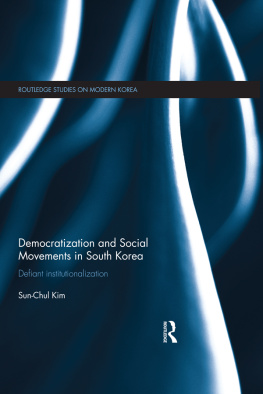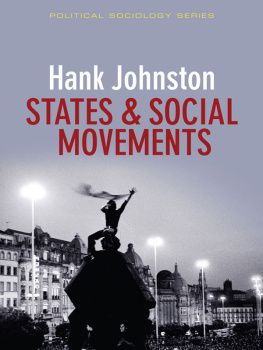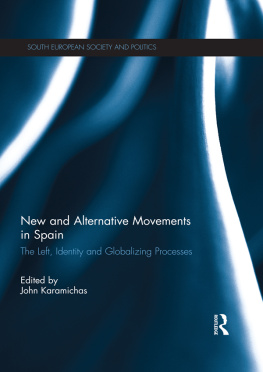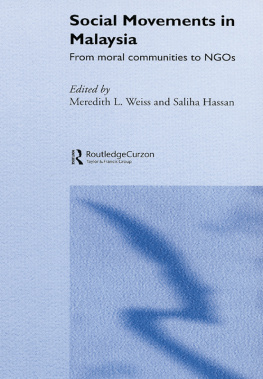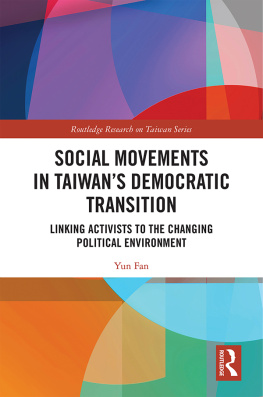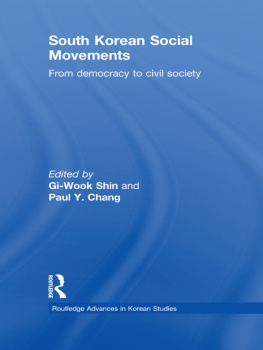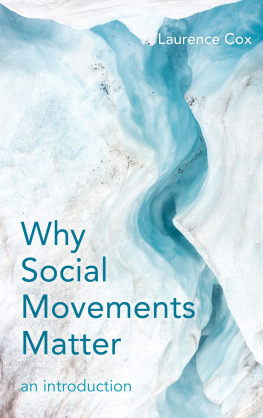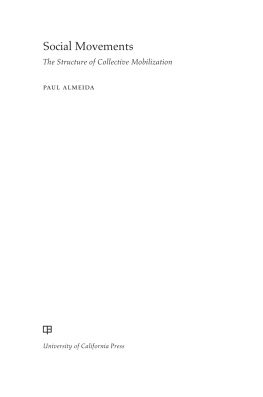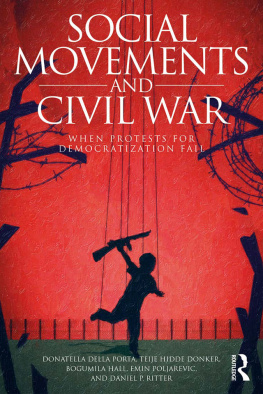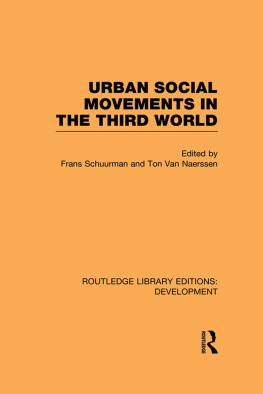Democratization and Social Movements in South Korea
South Korea provides an intellectual challenge in the fields of social movements and democracy in that intense mobilization and the strong influence of social movements have accompanied steady democratization for more than two decades, despite major theories having predicted otherwise.
This book examines how social movements in previously authoritarian contexts evolve after democratic transition, using South Korea as a case study. It explores how democratic change influences the form of social movements, and how social movements affect the pace and direction of democracy in turn. It explains how South Korean social movements were able to attain strong political influence by focusing on four causal factors: the configuration of major political actors during the transition period, the relational dynamics among social movement groups, the relationship between social movements and institutionalized political actors, and the impact of transnational forces in the post-transition period. Unlike previous scholarship, the book takes a historical, actor-centered, and process-oriented approach that closely follows the interactions among contending actors through event sequences, rather than being driven by abstract theoretical frameworks. In doing so, it analyzes a broad range of evidence, including police records, untapped activist documents, presidential memoirs, newspaper accounts and original datasets.
Shedding light on the complex political reality that gave rise to a contentious civil society in South Korea after democratization, this book also illuminates the institutional conditions that can help promote domestic peace and stability. Therefore it will be of great use to students and scholars of Korean Studies, Korean politics and social movements, as well as policy makers.
Sun-Chul Kim is a sociologist and Assistant Professor of Korean Studies at the Russian and East Asian Languages and Cultures, Emory University, USA.
Routledge Studies on Modern Korea
The Routledge Studies on Modern Korea series aims to accomplish the urgent task of advancing and bringing new prosperity to the field of Korean Studies by publishing high quality manuscripts on a variety of topics pertinent to modern day Korea, such as social governance, democratization, education, and multiculturalism.
The series is advised and edited by Hyuk-Rae Kim of the Graduate School of International Studies at Yonsei University, Korea.
| 1 | State-centric to Contested Social Governance in South Korea
Shifting power
Hyuk-Rae Kim
|
| 2 | Democratization and Social Movements in South Korea
Defiant institutionalization
Sun-Chul Kim |
First published 2016
by Routledge
2 Park Square, Milton Park, Abingdon, Oxon OX14 4RN
and by Routledge
711 Third Avenue, New York, NY 10017
Routledge is an imprint of the Taylor & Francis Group, an informa business
2016 Sun-Chul Kim
The right of Sun-Chul Kim to be identified as author of this work has been asserted by him in accordance with sections 77 and 78 of the Copyright, Designs and Patents Act 1988.
All rights reserved. No part of this book may be reprinted or reproduced or utilized in any form or by any electronic, mechanical, or other means, now known or hereafter invented, including photocopying and recording, or in any information storage or retrieval system, without permission in writing from the publishers.
Trademark notice: Product or corporate names may be trademarks or registered trademarks, and are used only for identification and explanation without intent to infringe.
British Library Cataloguing in Publication Data
A catalogue record for this book is available from the British Library
Library of Congress Cataloging in Publication Data
Names: Kim, Sun-Chul, author.
Title: Democratization and social movements in South Korea : defiant
institutionalization / Sun-Chul Kim.
Description: Abingdon, Oxon ; New York, NY : Routledge, 2016. | Series:
Routledge studies on modern Korea ; 2 | Includes bibliographical references
and index.
Identifiers: LCCN 2015033998| ISBN 041558258X (hardback) |
ISBN 1315642395 (ebook)
Subjects: LCSH: DemocratizationKorea (South) | Social changePolitical
aspectsKorea (South) | Social movementsKorea (South) | Korea
(South)Politics and government.
Classification: LCC JQ1729.A15 K596 2016 | DDC 320.95195dc23
LC record available at http://lccn.loc.gov/2015033998
ISBN: 978-0-415-58258-2 (hbk)
ISBN: 978-1-315-64239-0 (ebk)
Typeset in Times New Roman
by Wearset Ltd, Boldon, Tyne and Wear
This book is a product of long gestation. As a college student in the early 1990s, I first came up with the puzzling realization that South Korean social movements had radicalized in terms of both ideology and tactics at a time when political space and democratic freedoms were expanding. Ever since, I have tried to understand the dynamics of post-authoritarian social movements in relation to the features of democracy in South Korea. Along the way, I have reaped the benefits of the teachings and support of many people across two continents.
While I was conducting research in South Korea, Myungji Yang, Soo-Jeong Choi, and Keun-bok Lee helped me collect protest event data, for which I owe much gratitude. I also want to thank Inspector Hwang Gyu-jeong at the National Police Agency for her help guiding me through the byzantine police archives, and Dong-Choon Kim for helping me access the democracy movement archives at Sungkonghoe University in its early phase. Myoftentimes soju-infusedconversations with Dongno Kim, Ou-Byung Chae, Jeong-hoon Kim, Wonjae Lee, Soochul Kim, Kwangkun Lee, Eunjoo Cho, Jeongsoo Kang, Heejin Jun, Choe So-yng, Jae-Sok Sonn, Heeju Shin, Myungho Paik, Chang Sk-jun, Kim Hynwoo, Seongcheol Yook, Yun Sang-chl, Yi Tae-ho, Joon Han, Cho Heeyeon, and Paik Wn-dam were essential in forming my thoughts at various stages of this project. This book was conceived in no small part due to the support from the Academy of Korean Studies Grant, funded by the South Korean Government (MOEHRD, Basic Research Promotion Fund) (AKS-2007-CA-3001). I thank Hyuk-Rae Kim for providing me with the passage to this grant.
Columbia University, Barnard College, and New York City provided me with the privilege to come into contact with many teachers and friends whose insights and support were indispensable to this project. I am most grateful to have crossed paths with Chuck Tilly, Peter Bearman, Francesca Polletta, Diane Davis, Mark Kesselman, Alfred Stepan, and Charles Armstrong from whom I received invaluable guidance in the formative stage of my research. In particular, I am forever indebted to Chuck Tilly who believed in me from the beginning and guided me through each and every step of my research. His absence is sorely felt, as he was the best teacher, mentor, and friend one could ever hope for. Among the critical roles he played as a teacher and mentor was through organizing the Contentious Politics Workshop, which provided a platform to meet and converse with scholars from a wide range of backgrounds. I owe enormous debt to Roy Lickleider, Michael Hanagan, Vince Boudreau, Christian Davenport, Susan Woodward, John Krinsky, James Jasper, Ann Mische, Cathy Schneider, Debra Minkoff, Laleh Khalili, Mona El-Ghobashy, Adriene LeBas, Elke Zuern, John Krinsky, Lesley Wood, Nicholas Toloudis, Denise Milstein, Isil Celimni, Randa Serhan, Ceclia Walsh-Russo, Erzsebet Fazekas, Hamid Rezai, Xi Chen, Jose Aleman, Ondej Csa, Andreas Koller, Hwaji Shin, Ha Kyung Kim, and so many others who read, critiqued, and helped better my work.

